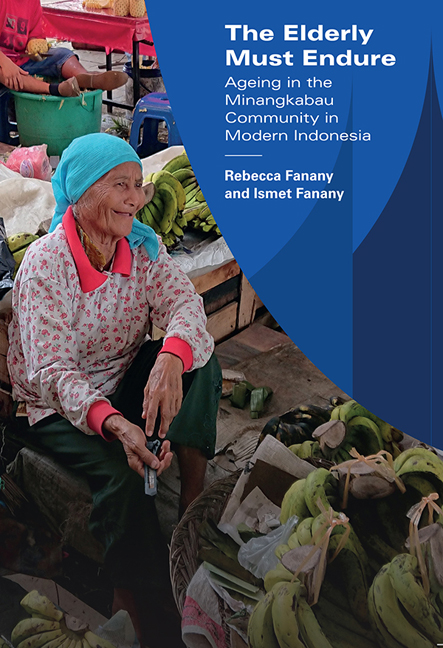Book contents
- Frontmatter
- Contents
- Acknowledgements
- Map of Indonesia
- Map of West Sumatra
- Map of the Village of Koto
- Aminah's Family Tree
- 1 Introduction
- 2 Ageing in the Past and Present
- 3 Adat Traditions and the Elderly
- 4 Religion and the Elderly
- 5 Language and the Elderly
- 6 Ageing in the Village
- 7 Ageing in Padang
- 8 Ageing in the Rantau
- 9 Ageing in an Institution
- 10 Ageing and Cultural Consonance
- 11 The Elderly Must Endure
- Afterword
- References
- Index
- About the Authors
5 - Language and the Elderly
Published online by Cambridge University Press: 16 May 2019
- Frontmatter
- Contents
- Acknowledgements
- Map of Indonesia
- Map of West Sumatra
- Map of the Village of Koto
- Aminah's Family Tree
- 1 Introduction
- 2 Ageing in the Past and Present
- 3 Adat Traditions and the Elderly
- 4 Religion and the Elderly
- 5 Language and the Elderly
- 6 Ageing in the Village
- 7 Ageing in Padang
- 8 Ageing in the Rantau
- 9 Ageing in an Institution
- 10 Ageing and Cultural Consonance
- 11 The Elderly Must Endure
- Afterword
- References
- Index
- About the Authors
Summary
THE LINGUISTIC CONTEXT IN INDONESIA
The linguistic context in Indonesia is extremely complex. Since achieving independence in 1945, Indonesia has used bahasa Indonesia (literally, “the language of Indonesia”) as its national language, a situation that was anticipated by the nationalist movement as early as the 1920s. In fact, the origin of the national language is usually dated to the Youth Pledge (Soempah Pemoeda) made by nationalist leaders in 1928 that called for a future nation of Indonesia whose language would be Indonesian (Foulcher 2000). However, despite the fact that this formalization of the language came less than 100 years ago, there had been a de facto Indonesian language in use for centuries before this time.
Modern Indonesian is a standardized form of Malay, a member of the Austronesian family of languages, that had been in use as a lingua franca in the region that now makes up the modern nations of Indonesia, Malaysia, Singapore, and Brunei Darussalam. In its earliest period of usage, Malay was likely a trading language used to facilitate interaction among people who spoke different languages that were also indigenous to the islands that would become Indonesia. Over time, it spread and developed and eventually came to be associated with Islam and the religious and cultural practices that were related to the religion (Adelaar and Himmelmann 2005).
Indonesia eventually became the Netherlands East Indies, first under the control of the Vereenigde Oost-Indische Compagnie (VOC) and later the Dutch government when the VOC collapsed in 1800, after nearly 200 years of operation. Portuguese traders and missionaries were also active in the eastern part of the region before the VOC consolidated its holdings. The British, who had colonized the Malay peninsula, held the region of Bengkulu on the island of Sumatra from 1685 to 1824. There was great interest in the area by European explorers because of the availability of a wide range of spices that had been known in Europe for centuries but that had been controlled by middlemen in the Arab world and India (Ellen 1977; Ricklefs 2008). Despite intense interaction with European powers over a period of centuries, the languages of the colonizers remained a source of loan words but never became widespread media of communication in Indonesia.
- Type
- Chapter
- Information
- The Elderly Must EndureAgeing in the Minangkabau Community in Modern Indonesia, pp. 95 - 115Publisher: ISEAS–Yusof Ishak InstitutePrint publication year: 2018

